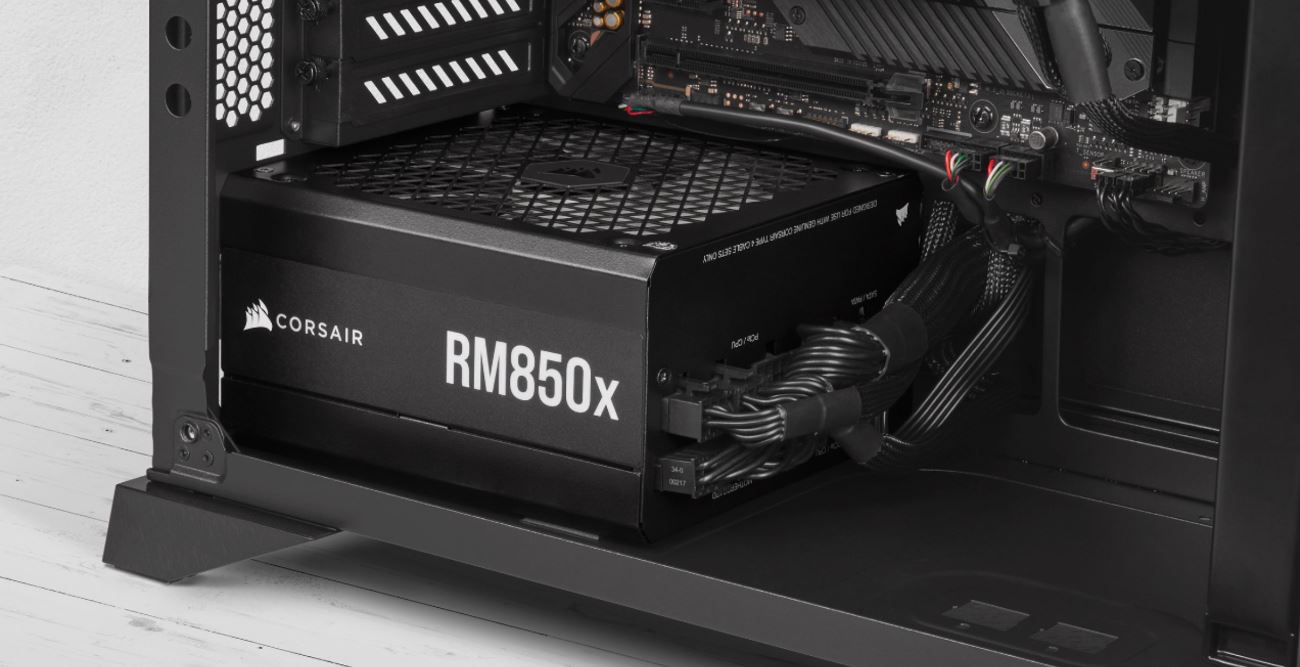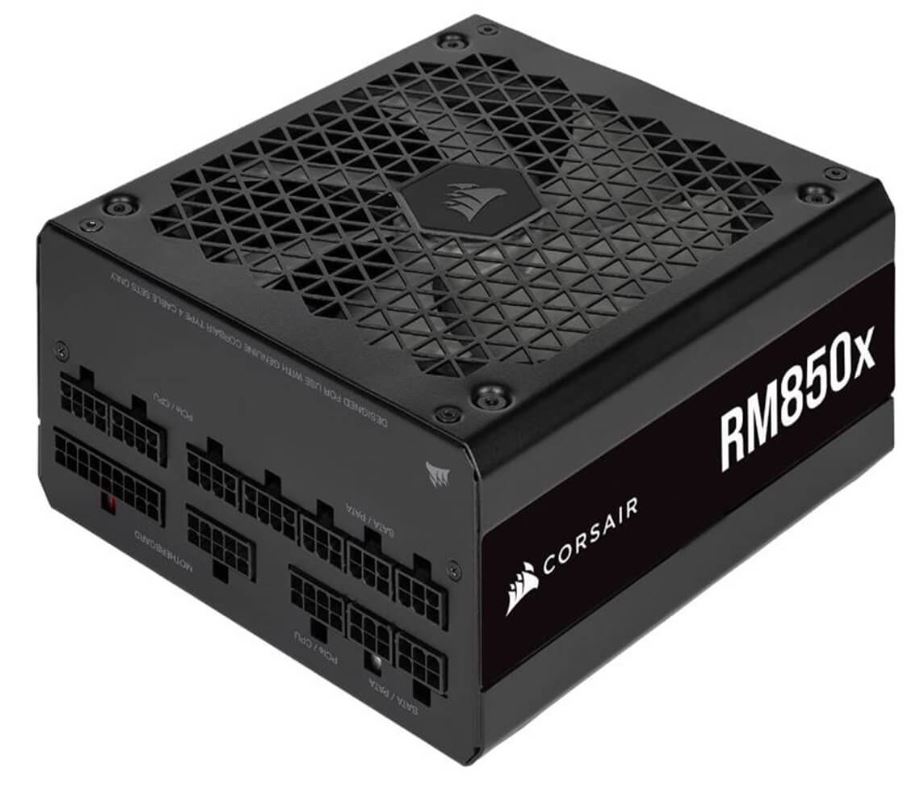
Corsair ATX Power Supply
About Corsair
Corsair is a well-known company that specializes in producing high-performance gaming and computer hardware. Founded in 1994, Corsair has established itself as a leading brand in the gaming industry, offering a wide range of products tailored for gamers and PC enthusiasts.
Corsair’s product lineup includes gaming peripherals such as keyboards, mice, headsets, and mousepads. They are known for their durable construction, ergonomic designs, and customizable features that cater to the specific needs and preferences of gamers. Corsair’s peripherals often incorporate advanced technologies such as mechanical key switches, high-precision sensors, and immersive audio for an enhanced gaming experience.
Introduction
CORSAIR RMx Series enthusiast power supplies are optimized for silence, with a custom fan design and Zero RPM Fan Mode. 80 PLUS Gold-rated efficiency ensures low-cost operation, and the fully modular black cables allow for fast, neat builds. All Japanese 105°C capacitors make it a great choice for high-performance PCs where reliability is essential.
Safety and protection
- Over-voltage protection (OVP): Over-voltage protection for the 12V, 5V, and 3.3V DC outputs is required to comply with the ATX specification. OVP shuts down the PSU in the event that the DC outputs exceed a set level, determined by the PSU manufacturer. The minimum voltage levels required for compliance are 13.4V for the +12V rail(s), 5.74V for the +5V rail, and 3.76V for the 3.3V rail.
- Over-current protection (OCP): The RMx Series features OCP on the 3.3V, 5V, and 12V rails. OCP ensures that the output of the DC voltage rails remains within safe operating limits.
- Over-temperature protection (OTP): OTP ensures that the PSU will shut down when the internal temperature reaches a set point. This is usually a result of internal current overloading or a fan failure.
- Short-circuit protection (SCP): A short-circuit is defined as any output impedance of less than 0.1 ohms. Amongst other things, SCP ensures that the PSU shuts down should the 3.3V, 5V, and 12V rails short to any other rail, or to ground. It also ensures that no damage should occur to the unit, or your PC’s components in the event of a short.
RM850x
Dimensions: 150mm (W) x 86mm (H) x 160mm (L)
Package contents:
- CORSAIR RMx Series power supply unit
- AC power cord
- DC Modular cable set
- DC Modular cable storage bag
- Cable ties
- CORSAIR case badge
- User manual
CORSAIR RM850x power table
CORSAIR RM850x power supply efficiency
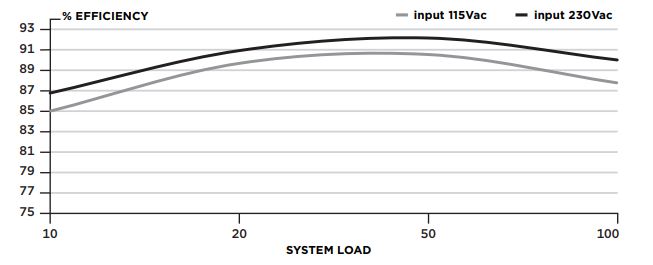
CORSAIR RM850x power supply fan noise curve
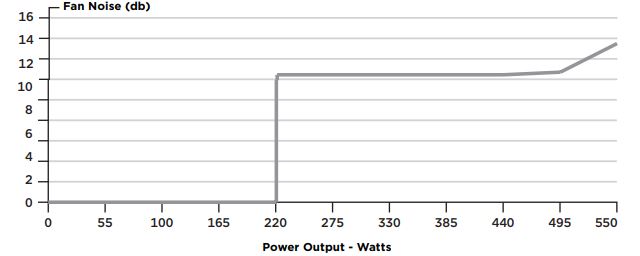
CORSAIR RM850x DC cable listing
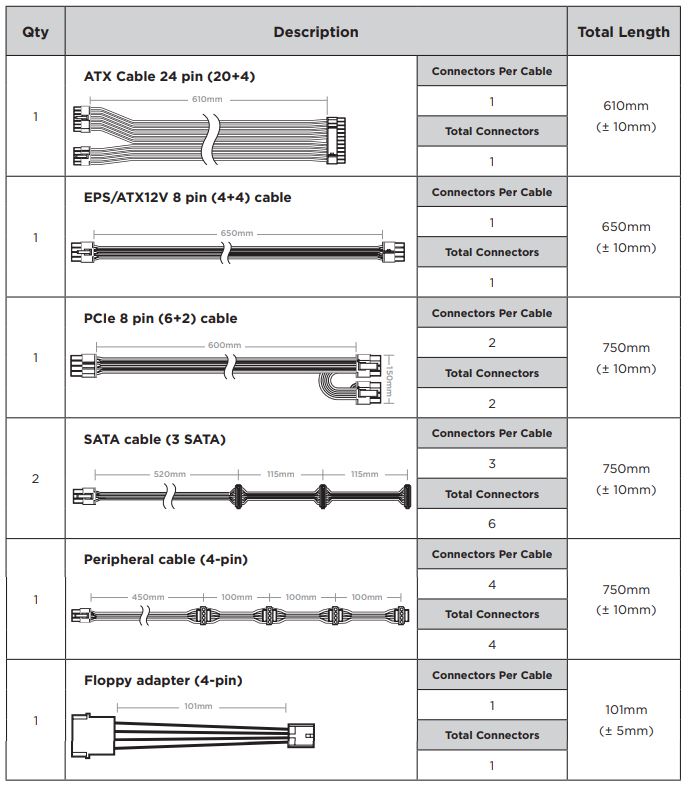
RM1000x
Dimensions: 150mm (W) x 86mm (H) x 180mm (L)
Package contents
- CORSAIR RMx Series power supply unit
- AC power cord
- DC Modular cable set
- DC Modular cable storage bag
- Cable ties
- CORSAIR case badge
- User manual
CORSAIR RM1000x power table
CORSAIR RM1000x power supply efficiency
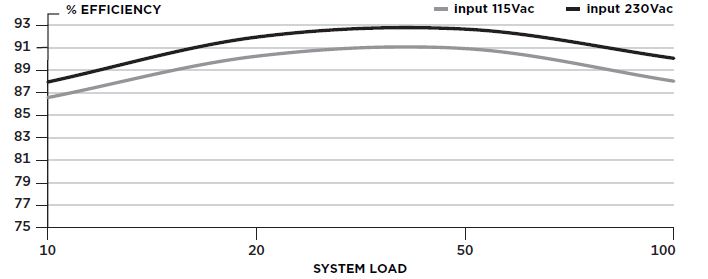
CORSAIR RM1000x power supply fan noise curve
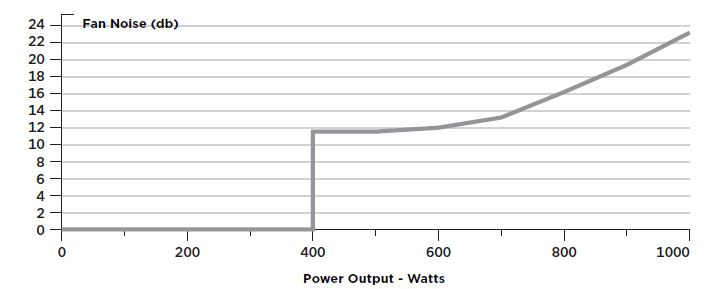
CORSAIR RM1000x DC cable listing
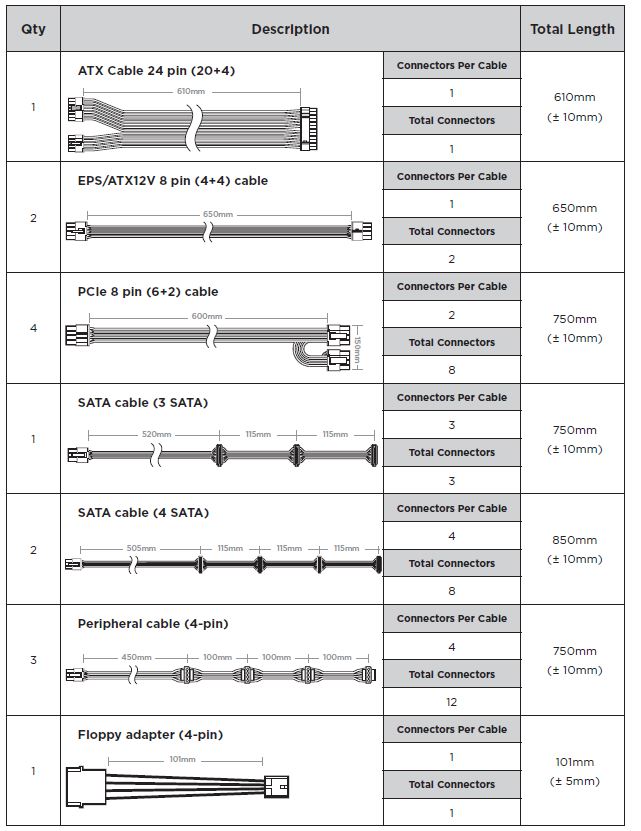
RM750x
Dimensions: 150mm (W) x 86mm (H) x 160mm (L)
Package contents
- CORSAIR RMx Series power supply unit
- AC power cord
- DC Modular cable set
- DC Modular cable storage bag
- Cable ties
- CORSAIR case badge
- User manual
CORSAIR RM750x power table

CORSAIR RM750x power supply efficiency

CORSAIR RM750x power supply fan noise curve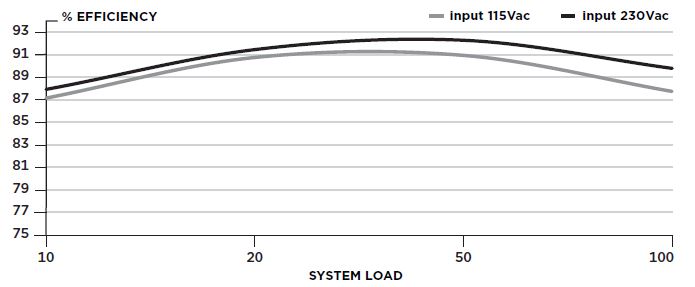
CORSAIR RM750x DC cable listing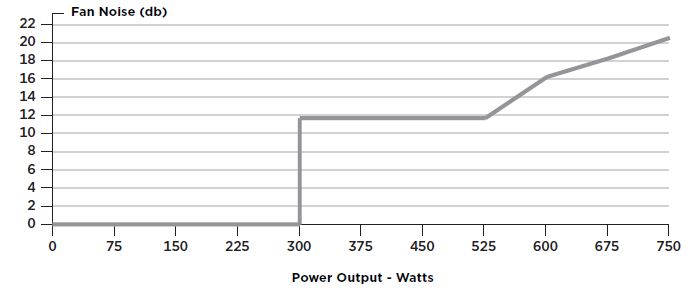
CORSAIR RM750x DC cable listing
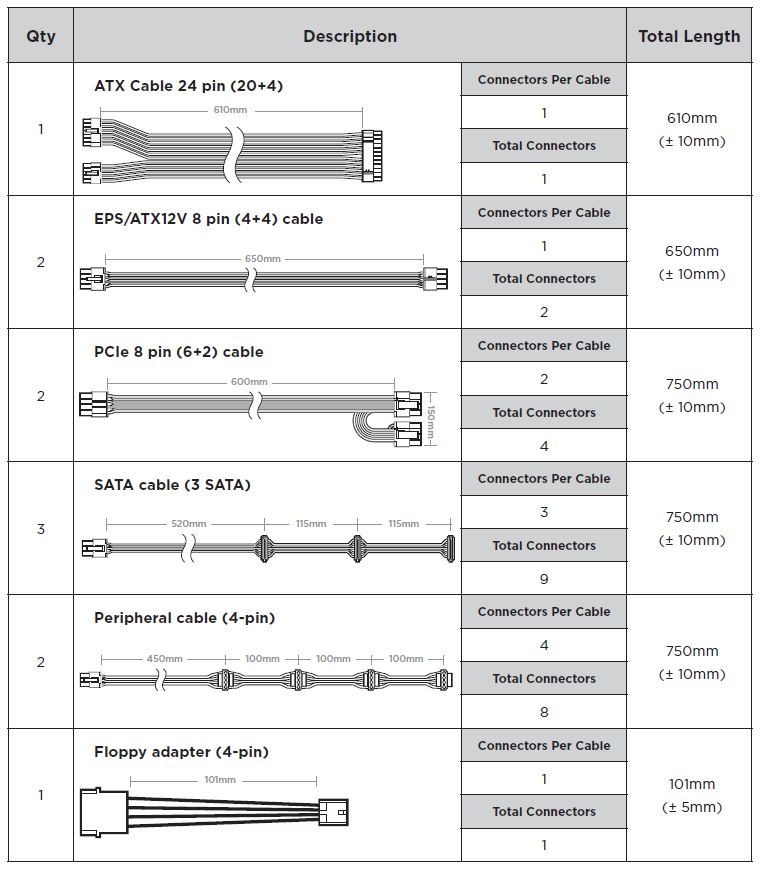
Installing your NEW RMx Series
Step A: Removing your existing power supply
If you are building a new system, skip to Step B.
- Disconnect the AC power cord from your wall outlet or UPS and from the existing power supply.
- Disconnect all the power cables from your video card, motherboard, and all other peripherals.
- Follow the directions in your chassis manual and uninstall your existing power supply.
- Proceed to Step B.
Step B: Installing the CORSAIR RMx Series power supply
- Make sure the power supply’s AC power cable is not connected.
- Follow the directions in your chassis manual and install the power supply with the screws provided.
- The main 24-pin power cable has a detachable 4-pin mechanism in order to support either a 24-pin or a 20-pin socket on the motherboard.
- If your motherboard has a 24-pin socket, you may connect the 24-pin main power cable from the power supply
directly to your motherboard. - If your motherboard has a 20-pin socket, you must detach the four-pin cable from the 24-pin connector, and then plug the 20-pin cable into your motherboard without connecting the four-pin connector.
- If your motherboard has a 24-pin socket, you may connect the 24-pin main power cable from the power supply
- Connect the eight-pin +12V (EPS12V) cable to the motherboard.
- If your motherboard has an eight-pin +12V socket, connect the eight-pin cable directly to your motherboard.
- If your motherboard has a four-pin socket, detach the four-pin from the eight-pin cable, and then plug this four-pin cable directly into your motherboard. WARNING: The detachable four-pin from the 24-pin main connector is not a “P4” or “+12V” connector. Serious damage can be caused if you use it in place of a “P4” or “+12V” connector.
- Connect the peripheral cables, PCI-Express cables, and SATA cables.
- Connect the peripherals cables to your hard drive and CD-ROM/DVD-ROM power sockets.
- Connect the SATA cables to your SATA SSD or hard drive’s power sockets.
- Connect the PCI-Express cables to the power sockets of your PCI-Express video cards if required.
- Connect the peripheral cables to any peripherals requiring a small 4-pin connector.
- Make sure all the cables are tightly connected. Be sure to save any unused modular cables for future component additions.
- Connect the AC power cord to the power supply and turn it on by pushing the switch to the ON position (marked with “I”).
Zero RPM mode
Zero RPM mode allows the fan to remain off during low to medium loads. This technology uses various temperatures from inside the PSU and the power output level to determine when active cooling is needed for the PSU. When you’re pushing it hard the fan will turn itself on to ensure that it gets the cooling it needs without any extra noise. For the specific fan profile of your unit please refer to the specifications section of that PSU.
Important safety information
![]() CAUTION ELECTRIC SHOCK HAZARD!
CAUTION ELECTRIC SHOCK HAZARD!
- Install in accordance with all manufacturer instructions and safety warnings. Failure to do so may result in damage to your power supply or system and may cause serious injury or death.
- High voltages are present in the power supply. Do not open the power supply case or attempt to repair the power supply; there are no user-serviceable components.
- This product is designed for indoor use only.
- Do not use the power supply near water, or in high-temperature or high humidity environments.
- Do not install near any heat sources such as radiators, heat registers, stoves, or other apparatus that produce heat.
- Do not insert any objects into the open ventilation or fan grill area of the power supply.
- Do not modify the cables and/or connectors included with this power supply.
- If this power supply uses modular cables, use only manufacturer-supplied cables. Other cables might not be compatible and could cause serious damage to your system and power supply.
- The 24-pin main power connector has a detachable 4-pin connector. This 4-pin connector is not a P4 or ATX 12V connector. Do not force this cable in the P4 or
ATX +12V socket on the motherboard. - Failure to comply with any manufacturer instructions and/or any of these safety instructions will immediately void all warranties and guarantees.
Safety and agency approvals
Agency Standard
FCC FCC Rules Part 15, Class B
ICES ICES-003
CE EN 55022: 2010, Class B
CISPR 22: 2008, Class B
AS/NZS CISPR 22: 2009, Class B
EN61000-3-2: 2006 + A1: 2009+A2: 2009, Class D EN61000-3-3: 2008, EN55024: 2010
IEC61000-4-2: 2008 ED.2.0
IEC61000-4-3: 2010 ED.3.2
IEC61000-4-4: 2012 ED.3.0
IEC61000-4-5: 2005 ED.2.0
IEC61000-4-6: 2008 ED.3.0
IEC61000-4-8: 2009 ED.2.0
IEC61000-4-11: 2004 ED.2.0
C TUV-US(American) UL 60950-1: 2007
RCM AS/NZS 4417,AS/NZS CISPR22
TUV EN 60950-1: 2006+A11+A1+A12+A2
CB IEC 60950-1: 2005+A1+A2
CCC GB4943.1-2011
GB9254-2008
GB17625.1-2003
CNS13438
CU TR R IEC 60950-1-2005
R 51318.22-99
R 51318.24-99
R 51317.3.2-2006
R 51317.3.3-99
ROHS 2002/95/EC, Restriction of Hazardous Substances Directive
WEEE 2002/96/EC, Waste Electrical and Electronic Equipment Directive
ROHS (China) China Order No.39, Administration on the Control of Pollution Caused By Electronic Information Products
KC K60950-1, K00022, K00024
BSMI CNS14336, CNS13438
FAQS About Corsair ATX Power Supply
Q: What is an ATX power supply?
A: An ATX power supply is a type of power supply unit (PSU) that follows the ATX (Advanced Technology eXtended) form factor specification. It is commonly used in desktop computers and provides the necessary electrical power to various components of the computer system.
Q: What makes Corsair ATX power supplies special?
A: Corsair is a well-known brand that offers a wide range of power supplies, including ATX power supplies, known for their reliability, efficiency, and performance. Corsair power supplies often feature high-quality components, modular cable designs, excellent power delivery, and robust cooling systems.
Q: What is modular cabling in a Corsair ATX power supply?
A: Modular cabling is a feature in certain Corsair ATX power supplies that allows you to detach and connect cables as needed. This feature provides flexibility and helps with cable management, as you only use the cables required for your specific configuration, reducing clutter inside the computer case.
Q: Are Corsair ATX power supplies compatible with all computers?
A: Corsair ATX power supplies are designed to be compatible with most standard ATX cases and motherboards. However, it’s always essential to check the specific power supply model and its compatibility with your computer components before making a purchase.
Q: What is the efficiency rating of Corsair ATX power supplies?
A: Corsair power supplies often come with various efficiency certifications, such as 80 Plus Bronze, 80 Plus Gold, 80 Plus Platinum, or even higher ratings. These certifications indicate the power supply’s energy efficiency at different loads, with higher ratings indicating higher efficiency.
Q: Are Corsair ATX power supplies quiet?
A: Corsair power supplies are designed with attention to noise reduction. They often incorporate features like quiet fans with optimized curves and low-noise operation. However, noise levels can still vary depending on the specific model and load conditions, so it’s advisable to check reviews or specifications for noise information.
Q: Do Corsair ATX power supplies come with a warranty?
A: Yes, Corsair ATX power supplies typically come with a warranty, the length of which depends on the specific model. The warranty period can vary from 3 years to 10 years, offering protection and peace of mind for your power supply investment.
Q: Can Corsair ATX power supplies support multiple GPUs?
A: Yes, many Corsair ATX power supply models are designed to support multiple GPUs (graphics processing units) in multi-GPU setups. These power supplies usually have higher wattage ratings and multiple PCIe power connectors to accommodate the power requirements of multiple high-performance graphics cards.
Q: Can I use a Corsair ATX power supply for a mini-ITX or micro-ATX build?
A: Yes, you can use a Corsair ATX power supply for mini-ITX or micro-ATX builds. However, since these smaller form factor cases often have limited space, it’s important to check the physical dimensions of both the power supply and the case to ensure compatibility. Corsair also offers SFX (Small Form Factor) power supplies specifically designed for compact builds.
For more manuals for Corsair, Visit Manualsdock
[embeddoc url=”https://manualsdock.com/wp-content/uploads/2023/07/Corsair-ATX-Power-Supplys-User-Manual.pdf” download=”all”]

